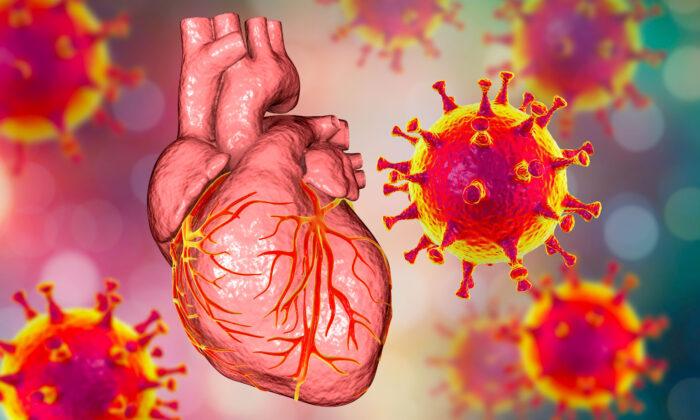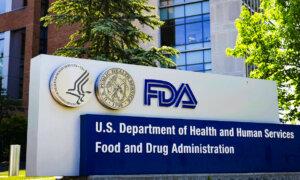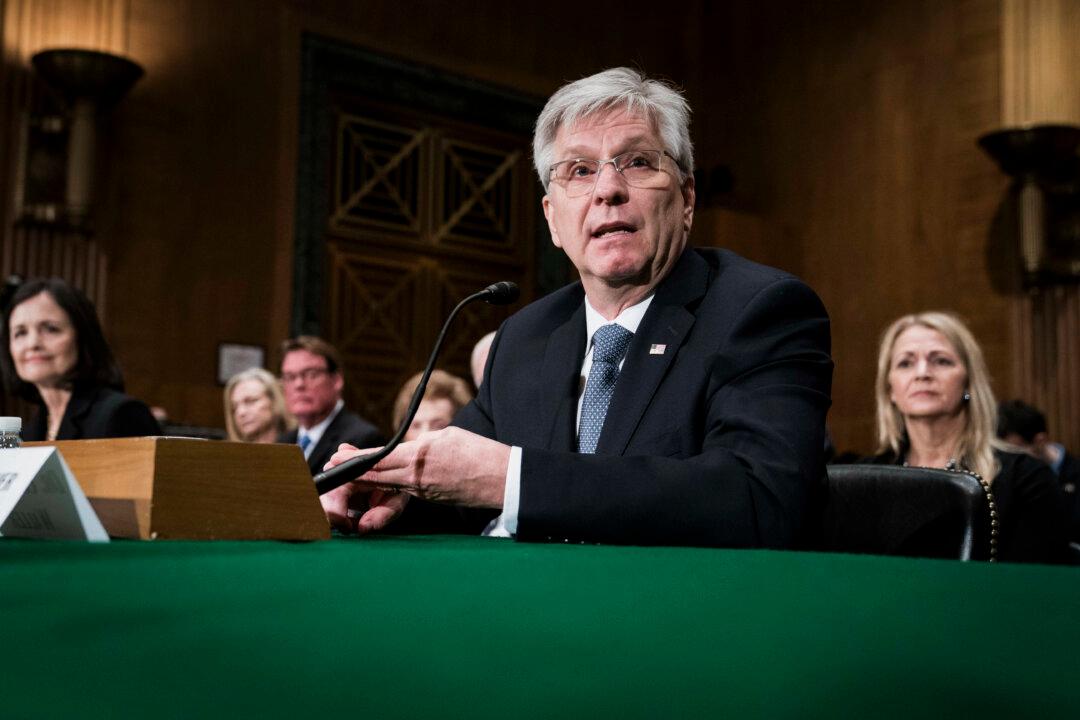Cases of myocarditis jumped 223 times in the first year of the COVID-19 vaccination campaign in the United States, with children and young adults at high risk of hospitalization and death, according to a recent study.
In their analysis, researchers used data from the Vaccine Adverse Event Reporting System (VAERS) to look at the number of myocarditis cases reported as side effects from vaccinations.
“We found the number of myocarditis reports in VAERS after COVID-19 vaccination in 2021 was 223 times higher than the average of all vaccines combined for the past 30 years. This represented a [2,500 percent] increase in the absolute number of reports in the first year of the campaign when comparing historical values prior to 2021,” the study said.
Roughly 50 percent of myocarditis cases occurred among youths and 69 percent of affected individuals were males. Out of a total of 3,078 COVID-19 vaccine-induced myocarditis cases as of August 2023, 76 percent resulted in emergency care and hospitalization, and 3 percent died.
Researchers concluded that COVID-19 vaccination is “strongly associated” with a risk of myocarditis, “particularly in children and young adults resulting in hospitalization and death.” They called for investigating the links between COVID-19 vaccination and myocarditis to create “effective mitigation strategies” against the health complication.
While 3,078 myocarditis cases were reported, the study notes these could be “just the tip of the iceberg” since underreporting is a “known and serious disadvantage of the VAERS system.”
Authors estimated that the actual myocarditis cases could be as many as 95,418, or a 31-fold difference.
Between 1990 and 2020, an average of 10.8 myocarditis reports were filed in VAERS annually. But in 2021 alone, 2,414 cases were filed.
“A disproportionately high number of reports were filed just shortly following the COVID-19 vaccine rollout,” researchers said.
Out of the 3,078 cases of COVID-19-induced myocarditis tracked in the study, Pfizer’s mRNA vaccine accounted for over 62 percent of these incidents. Moderna came in second with 33 percent of cases, followed by Janssen in the third spot at less than 4 percent.
Researchers found that 30 percent of myocarditis cases were reported among people age 20 and younger and 50 percent among people age 30 and younger. Children and teens aged 12 to 17 years had the highest reporting rate with 571 reports, representing 19 percent of all myocarditis reports.
High Risks With Second Dose
Myocarditis reports were “significantly higher” following the second dose of the COVID-19 vaccine injection, the study found. There were five times as many myocarditis reports following the second dose among 15-year-old males.“If the effects of each dose were the same, then we would expect to see the same number of reports filed following each dose. This indicates that the effects of dosing a second time may be more damaging and cumulative with each additional dose,” the study said.
Following the second dose, 77 percent of reports were filed within seven days and 48 percent within 48 hours, it said.
The study gave two examples of healthy individuals dying after taking COVID-19 injections. A 33-year-old man died from cardiac arrest while running, 600 days after receiving the second dose of the Pfizer vaccine.
In another instance, a 15-year-old boy died after being hospitalized due to symptoms of fever, nausea, and headache nearly one year after the first dose of the Pfizer shot.
Chest pain was found to be in tandem with vaccine adverse events. The study pointed out that 51 percent of individuals filing for myocarditis in VAERS experienced chest pain, which “may not be interpreted by children, adolescents, or even medical professionals, as a warning of myocarditis.”
“If myocarditis has developed after the first injection, then subsequent administrations should be avoided at all costs,” the researchers warned.
Particles of mRNA have been found circulating in the bloodstream up to 28 days after vaccination and spike protein has been found among vaccinated individuals for up to one year, they said, citing multiple studies.
Research has shown that the circulating spike protein is not “effectively bound” by antibodies among children with myocarditis. Spike protein and inflammation in the myocardium have also been found in an investigation of young people with COVID-19-induced myocarditis, the study said.
Developing a “novel genetic product” would usually require 10 years of safety and efficacy assessment. However, the COVID-19 vaccines were “rushed through phase I–III trials,” study authors said.
VAERS data for COVID-19 vaccines were already showing safety signals from January 2021, the study said, adding that reports of deaths following vaccine administration should have prompted withdrawal of the shots.
“At the time of writing, the CDC recommends everyone 6 months and older to receive an updated COVID-19 booster. However, children have a negligible risk for COVID-19, and yet they are a high-risk group for myocarditis from COVID-19 vaccination as shown by our results,” the researchers stated.
CDC Alert Suppression
A document recently obtained by The Epoch Times shows that in May 2021, the U.S. Centers for Disease Control and Prevention (CDC) had prepared a draft alert for myocarditis from COVID-19 vaccination.A May 25, 2021, email from Dr. Sara Oliver, a CDC official, stated that “the pros and cons of an official HAN are what the main discussion are right now,“ and that ”I think it’s likely to be a HAN since that is CDC’s primary method of communications to clinicians and public health departments, but people don’t want to appear alarmist either.”
Dr. Oliver was corresponding with an employee of either Moderna or Pfizer in the email.
Commenting on these revelations, Sen. Ron Johnson (R-Wis.), the top Republican on the Senate Homeland Security Permanent Subcommittee on Investigations, said that CDC’s decision “to not immediately issue a formal alert to clinicians warning them about the increased risk of myocarditis and pericarditis in vaccinated individuals is not only inexcusable, it’s malpractice.”
He said that CDC should never prioritize its public perception over the safety of American citizens and called for officials who decided to stay the alert to be held “fully accountable” for their actions.
Dr. Joel Wallskog, co-chair of the vaccine-injured advocacy group React19, called the “censorship of a proposed alert in May of 2021 … just one more example of our regulatory agencies’ repeated pattern of behavior to censor any information that serves to counter the narrative that the COVID-19 vaccinations are ’safe and effective.’”
A study from Dec. 27 showed that a majority of people affected by heart conditions such as myocarditis after receiving COVID-19 shots were still suffering from the symptoms six months after the illnesses were diagnosed.








